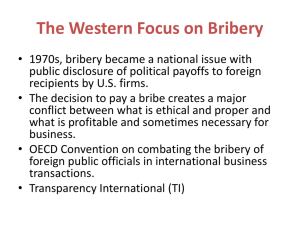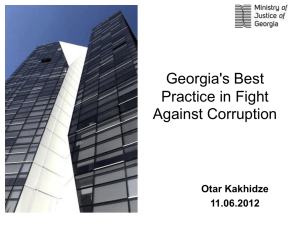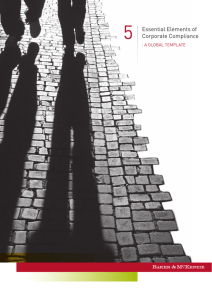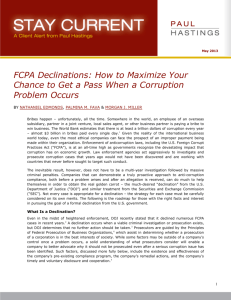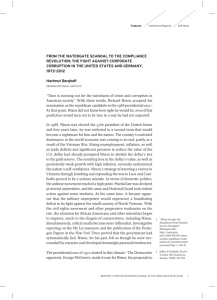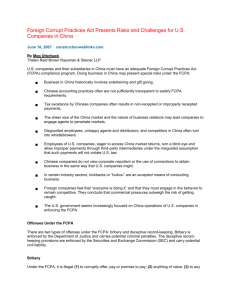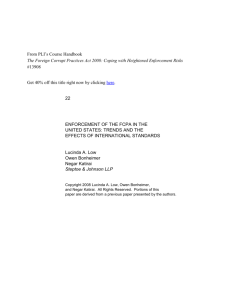May 2014 - Momentum Events
advertisement
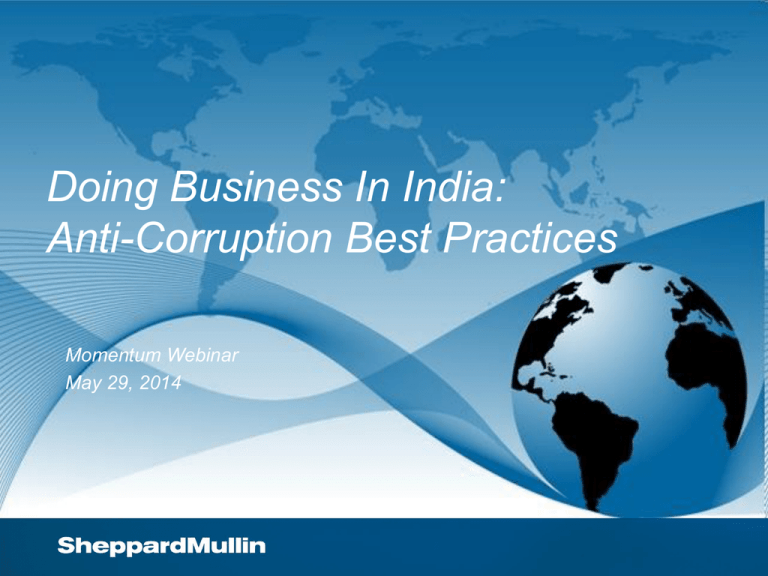
Doing Business In India: Anti-Corruption Best Practices Momentum Webinar May 29, 2014 Agenda • Introduction • Overview of FCPA • Corruption Challenges / Enforcement in India • Compliance Best Practices • Questions 2 India’s Business Potential … • Growing economy • Barriers to entry eroding • Cost-competitiveness • Talent pool • Emerging middle class • Outpacing China in Foreign Direct Investment 3 … and Business Challenges • Corruption cited as second most problematic factor by World Economic Forum • Lack of infrastructure is ranked first • Others: • • • • bureaucracy tax regulations restrictive labor regulations administrative delays 4 Overview of the FCPA Foreign Corrupt Practices Act (FCPA) • Prohibits bribery of non-U.S. government officials • Requires companies to maintain accurate records and robust internal controls • Regulators – Department of Justice (DOJ) – Securities and Exchange Commission (SEC) 6 Anti-Bribery Provisions • No covered person may make, offer, promise, or authorize, • A payment or anything of value, • With corrupt intent, • To a government official, • To obtain or retain business or an unfair advantage. 7 Payment • Can be an actual payment or gift • Can also be an offer or promise to pay • May be in response to request from official • It is enough to authorize a payment ** Includes direct and indirect payments** 8 Thing of Value • Anything of value to the recipient – Money – Gift – Hospitality – Loan/favorable financing – Discounted/free maintenance – Donation – A job for official’s son / daughter 9 Foreign Official • An officer, employee, or agent of any – Indian government, whether national, state, local, etc. – Department or agency of the Indian government – Company, entity, or other instrumentality owned/controlled by the Indian government – Public international organization (e.g., the UN, the WTO) – Indian political party 10 Foreign Official (cont.) • Candidate for Indian political office • Anyone acting on behalf of a Foreign Official • Person holding ceremonial title (e.g., royal family member with no government position) • Rank or title is irrelevant 11 Obtain Business / Advantage • Obtain contract from government agency • Achieve regulatory change that benefits business • Direct award of business opportunity to family member • Receive favorable ruling on applicable customs duties 12 Permissible Payments • When permitted under written laws of country • Mere custom is not adequate OR • Reasonable and bona fide expense directly related to: • Execution or performance of a contract with government party, or • Demonstration, promotion, or explanation of a product or service 13 Facilitating Payments • Payments to expedite non-discretionary “routine governmental actions” such as: • Loading / unloading cargo • Award of a visa • Many companies prohibit facilitation payments entirely 14 Third Party Risks Any party acting on your behalf, e.g., a • Subsidiary or other affiliate • Agent, sponsor, representative, distributor, consultant • Joint venture party Examples: • Your Customs broker in Mumbai • The lobbying firm you engage in Delhi • A marketing agent in Hyderabad 15 Recordkeeping and Internal Controls • Keep detailed and accurate transactional records • Maintain system of internal controls to ensure management has oversight over and control of transactions − Obtain authorizations prior to transactions − Collect necessary approvals before reimbursement − Record transactions fully and accurately − Take steps so partners do the same 16 Enforcement Related to India • Oracle (2012): Indian subsidiary involved in alleged bribery; $2 million fine to SEC • Diageo (2011): Subsidiaries in India (and elsewhere) alleged to have paid $2.7 million in bribes for sales and tax benefits; $16.4 million in penalties to SEC • Pride International (2010): Company apparently made $500,000 in improper payments to judges on India’s Customs, Excise, and Gold Appellate Tribunal; $32.6 million to DOJ and $19.3 million to SEC 17 Enforcement (cont.) • Control Components Inc. (CCI) (2009): Allegedly made $4.9 million in illicit payments to officials in various countries, including Maharashtra State Electricity Board in India; $18.2 million in fines • Wabtec (2008): Subsidiary said to have made over $170,000 in payments to Indian Railway Board employees, inspectors, and customs personnel to obtain railway contracts; $300,000 to DOJ and $87,000 to SEC • Electronic Data Systems (EDS) and Srinivasan (2007): Former president of AT Kearney India caused ATKI to make over $720,000 in payments to employees of state-owned companies to retain contracts worth $7.5 million; Srinivasan paid $70,000 fine; EDS paid $490,902 in penalties 18 FCPA Enforcement (cont.) Wal-Mart: Company investigating wide-ranging bribery allegations Company’s agents in India allegedly procured numerous licenses required for setting up stores Partnered with Indian company to expand India operations; ended partnership amidst FCPA probe 19 Corruption Challenges / Enforcement in India Corruption in India • Ranked 94 of 177 countries in TI’s 2013 Corruption Perceptions Index • Indian economists estimate government officials earn as much as 1.26% of GDP through corruption • Evidence of some companies halting business in India because of corruption 21 Factors Contributing to Corruption • Government officials are poorly paid • General attitude toward bribery more relaxed • Bribery viewed as an accepted part of doing business • Cumbersome procedures/red tape • Officials have substantial discretion 22 Highest Corruption Risks • Sales to government customers • Obtaining licenses, permits, and registrations • Clearing customs – paying duties and taxes; logistics (using freight-forwarders) • Navigating bureaucracy / complex laws 23 Where Corruption is Pervasive • Vulnerable sectors – metals & mining • $194 billion lost in government sale of coalfields to companies without competitive bidding – aviation • Air India reportedly losing millions due to corruption and mismanagement of aircraft repairs – – – – power & utilities aerospace & defense infrastructure & construction telecoms 24 Common Schemes and Themes • Small sums • Services already due: customs clearance, taxation, water and land records issuance • Use of agents and/or consultants • Slush funds or petty cash funds • Fictitious invoices • Indirect benefits – hiring third parties at official suggestion • Lavish gifts and entertainment • Donations to organizations owned/recommended by officials 25 Potential Compliance Gaps Improper gift-giving (cash, computers, large dollar travel) • “Check the box due” diligence – consider specific local factors to take risk-based approach Improper use/oversight of third parties Customer relationships built on trust – resistance to memorializing business agreements in formal contracts 26 Indian Anti-Corruption Law • Limited in scope and enforcement • Prevention of Corruption Act (PCA) 1988 • India ratified United Nations Convention Against Corruption (UNCAC) in 2011 • Lokpal Bill passed in December 2013; new agency established to investigate and prosecute 27 Recent Events • In recent years, public has taken to streets to voice outrage after corruption scandals • January 2014 - $670 million helicopter deal with BritishItalian company terminated due to corruption allegations • April 2014 – DOJ asked India to arrest member of Indian parliament who granted mining rights for $18 million in bribes • Modi’s election and pro-business platform 28 Indian Government Investigations • 2010: Investigation of Commonwealth games in New Delhi • 2011: CBI arrested Chief and aides of organizing committee for awarding illegal contracts to Swiss manufacturer • Officials being tried for illegalities in issuing 2G telecom licenses – revenue losses reportedly $40 billion 29 Compliance Best Practices Compliance Best Practices • Establish transparent tone at top • Prioritize / address risks • Tailor policies and procedures to risks • Keep good records 31 Tone at the Top • Establish top-down culture of compliance – Regularly assert importance of compliance – Commit resources to compliance infrastructure • Dedicated compliance personnel • Regular training • Helpline / reporting mechanism 32 Prioritize Risk • Expressly contemplated by DOJ and SEC Guidelines • Focus compliance resources on most significant risk areas such as: • Industry • Use / non-use of agents • Amount of interaction with government • Past compliance issues • Importance of cash to operation • Other factors 33 Policies and Procedures • Establish processes for: • Vetting business partners • Providing hospitality and gifts • Monitoring and auditing compliance • Internal reporting mechanisms • Opportunity for anonymous reporting • Prompt review and investigation as needed • Protect personnel from retaliation when report is in good faith 34 Questions? 35 THANK YOU! Jennifer Gorman AECOM Jennifer.Gorman@aecom.com Thad McBride Sheppard Mullin tmcbride@smrh.com Fatema Merchant Sheppard Mullin fmerchant@smrh.com


